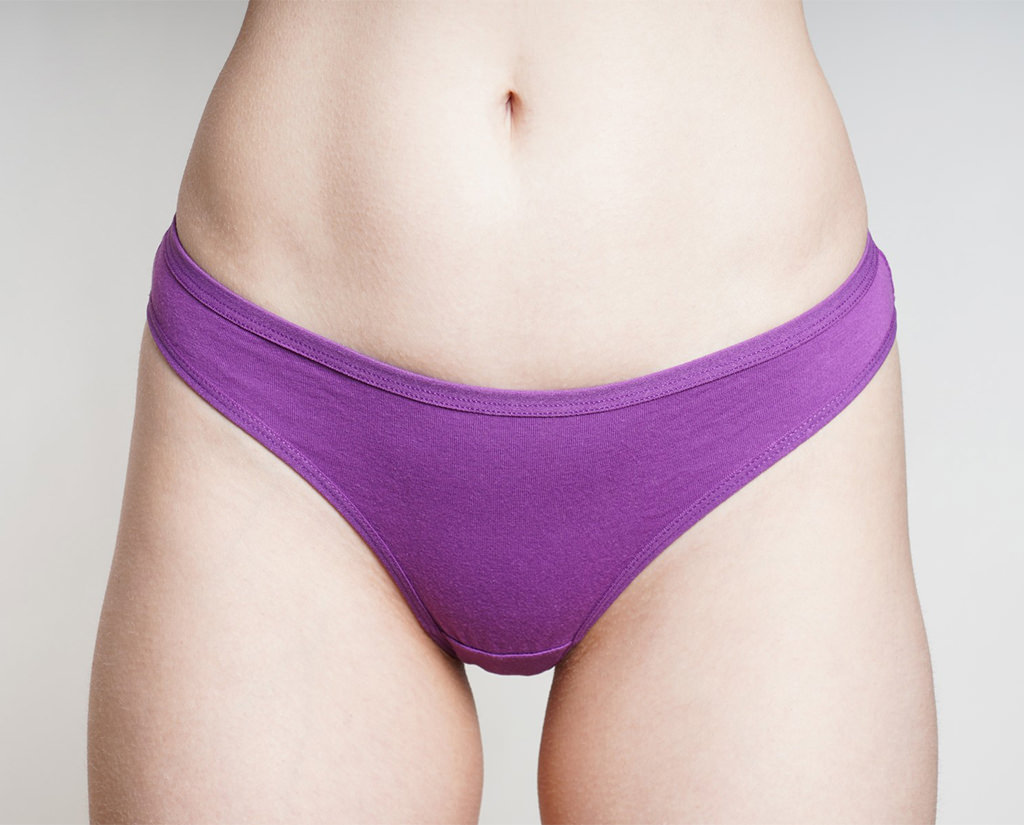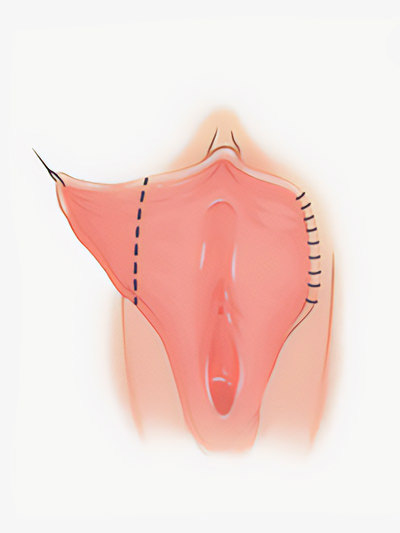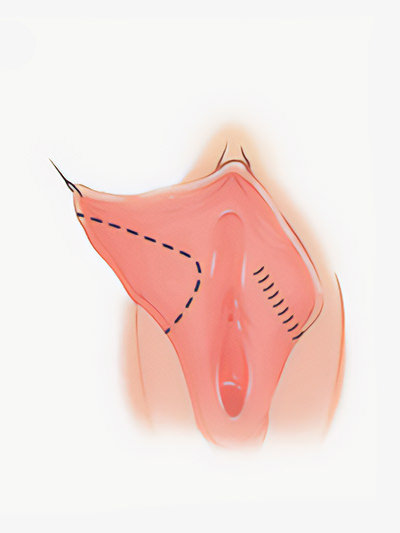Labiaplasty removes excess skin from the inner lips (labia minora). In some cases, this procedure can involve a reduction of the clitoral hood as well. Most often labia minora hypertrophy is congenital in nature (you were born this way) and is a variation of normal anatomy. Asymmetry of the labia minora is also very common. Labia minor hypertrophy can lead to discomfort during intercourse and can be bothersome in daily life, such during physical activities like biking and running. Labiaplasty aims to restore the labia minora to a proportional size for both functional and aesthetic reasons.
Patients who are good candidates for this procedure
- Are at a stable and healthy weight
- Have no significant medical problems
- Non-smokers
- Not on blood thinners
- Have hypertrophic or asymmetrical labia minora

Patients who are poor candidates for this procedure
- Obese (want or need to lose weight)
- Smoker
- Have serious medical problems
- On blood thinners
Are you a good candidate?
Our Self-Evaluation Quiz can help you decide if a labiaplasty is the right procedure for you.
Techniques for Labiaplasty
Labiaplasty is a straightforward procedure that can be done under local anesthetic in the office. Dr. Perry’s preferred technique is called a Modified Wedge Excision, which preserves the nerve sensation in this intimate area and allows for the most natural results. Patients are given a cream to numb the area, and a local anesthetic is injected to freeze the region. The procedure lasts approximately 45 minutes.
Dr. Gdalevitch uses a modified wedge technique to perform labiaplasty.
During surgery, Dr. Gdalevitch removes a V-shaped “wedge” from either side of the labia. This is then extended into the crease between the labia minor and labia majora to address any excess skin in those areas. She then stitches the remaining edges together to create a natural contour. This technique creates a small horizontal scar and a scar that is hidden in the crease between the labia minora and majora. This technique is also preferred as it allows for a more significant reduction of the hypertrophic labia and gives the most natural results.

Trim technique
Occasionally, a trim technique is a better option for certain patients. Usually, these patients have very mild hypertrophy and thin labia minora. Dr. Gdalevitch will explain to you which technique is better for you during your consultation.

Wedge technique
Discover the procedure through live surgeries
Consent for Labiaplasty
Pre-op instructions for Labiaplasty
At Phi Plastic Surgery, we believe that a beautiful body can take many shapes and sizes. The Phi philosophy centers on respecting your body's proportions and helping you let your inner beauty shine.
We offer our patients the best, most advanced techniques to help them achieve their aesthetic goals.
Pre-op & post-op instructions
These pre-surgical and post-surgical instructions are provided as essential services for you. Please follow the instructions carefully to ensure optimum results. If there are instructions that need to be clarified, please feel free to contact our office as soon as possible. If some instructions are not followed, your surgery could be delayed if deemed necessary by your surgeon.
Pre-op INSTRUCTIONS
THREE WEEKS before your surgery
- Stop all consumption of collagen
- Prepare your surgery date: Plan to ensure a stress-free experience. Arrange your work leave and special assistance to help you with ride home. Prepare your return by organizing meals, delivery, babysitting, etc. Make sure you have someone scheduled to accompany you home after your surgery. Someone should also be on-call to help you during the first 24 hours after your surgery.
TWO WEEKS before your surgery
- Stop the consumption of anti-inflammatory drugs.
- Aspirin, drugs containing aspirin or any anticoagulants such as arixtra pf, clopidogrel, plavix, coumadin, dalteparin, edoxaban, eliquis, apixaban, enoxaparin, fragmin pfsyringe, lepirudin, padaxa, dabigatran etexilate, xarelto, rivaroxaban.
- A preoperative visit (if necessary), approximately two weeks before your surgery, will be scheduled to review your goals and provide you with additional information regarding your surgery.
SEVEN DAYS before your surgery
- Stop taking any supplements or medications from the list below. These products can increase the risk of bleeding and other complications. Stop consuming any non-prescribed supplements including: Omega 3-6, nutricap, echinacea, glucosamine, fat burners, St. John’s wort.
- Confirm your surgical support plan: This includes your transportation and post-surgical care, including an adult family member or a friend on-call for your support, 24 hours after your surgery.
- Purchase any prescription provided by Dr. Gdalevitch (If applicable) and revise your pre-surgical instructions.
The day BEFORE your surgery
Prepare a bag. It should include:
- All necessary papers
- Your identification (RAMQ card)
- Prescription Drugs
- Glasses if necessary
- Confirm the person who will assist you for the first 24 hours after surgery.
- Take a shower. Use a non-perfumed soap. Wash your hair. Do not put cream or lotions. Do not put deodorants, hair products, perfumes, or makeup.
- Relax. Enjoy a good night's sleep and avoid stress.
YOUR SURGERY DAY
- If you wish to have oral sedation, do not eat or drink 4 hours before the surgery.
- Do not train before surgery.
- Please bring your medications that have been prescribed to you in a bag as above.
- Do not wear any make-up, jewellery, contact lenses, hairpin or piercings: during surgery, an electric cautery is used, any piercing or jewellery can cause burns.
- Wear light and comfortable clothing. Wear a top that opens forward. Do not wear a sweater, turtleneck or tight clothing. You can wear a skirt, but pants and a jogging jacket are ideal. Flat shoes should be worn that are easy to remove and to put on (no heels).
post-op instructions
The night of surgery
You can expect to have some pain in the area of the labia minora. To improve your comfort, you can:
- Take extra strength Tylenol every 4 hours
- Take the pain medication as prescribed
- Take the antibiotics
- Ice the area intermittently with a gauze between the ice and the skin (10 minutes on, 10 minutes off)
Please communicate with us immediately if you have:
- Fever over 38.5
- Severe nausea or vomiting
- Hallucinations or unusual behavior
- Pain that is not controlled by medications
- Excessive bleeding or drainage from your incisions
The day after surgery
- You can expect that your pain will start diminishing after 48 hours
- Swelling may increase over the first two days
Healing and follow up
- You will be swollen between 4- 6 weeks
- It is recommended to rest for a few days
- You will have a follow up between 1 and 2 weeks
- You will not see the final result before 1 month. Scarring continues to improve for 6 months to a year
Your results
The recovery is approximately one week, during which pain medication is taken to relieve post-operative pain. You will have some swelling and possibly mild bleeding that will taper off with rest and icing the area.
A labiaplasty will help you obtain a more functional and cosmetically appealing labia minora and will accomplish the following:
- Removal of excessive tissue from the labia minora
- Reduce physical discomfort with certain exercises or intercourse
- Allow the lips of the labia minora to sit within the labia majora
- Increase self-confidence
- Increase sexual pleasure and comfort
The end result is a smaller labia minora that feels more comfortable and aesthetically pleasing.
Labiaplasty presentation
View most frequently asked questions
Am I a good candidate for labiaplasty?
Women who are good candidates for labiaplasty are healthy and do not have active infections of the vagina.
Do I need to be put to sleep for labiaplasty surgery?
No. This surgery can be performed under local anesthesia. You are given a cream that freezes the area before starting the anesthesia so that you do not feel anything at all.
How long do I have to plan for recovery after labiaplasty?
The first week is painful, and you must plan to be off work. Regular activities and sexual intercourse can be resumed after one month.
How much does the procedure cost?
Labiaplasty - Bilateral
starting at $5,000

For a more beautiful and proportional you!
φ Phi is the Greek symbol that indicates the golden ratio, a ratio that is synonymous with beauty.
Dr. Perry Gdalevitch offers a unique approach that involves applying the principles of perfect proportions (phi) to help you achieve your aesthetic and reconstructive goals.

 PLASTIC
PLASTIC
